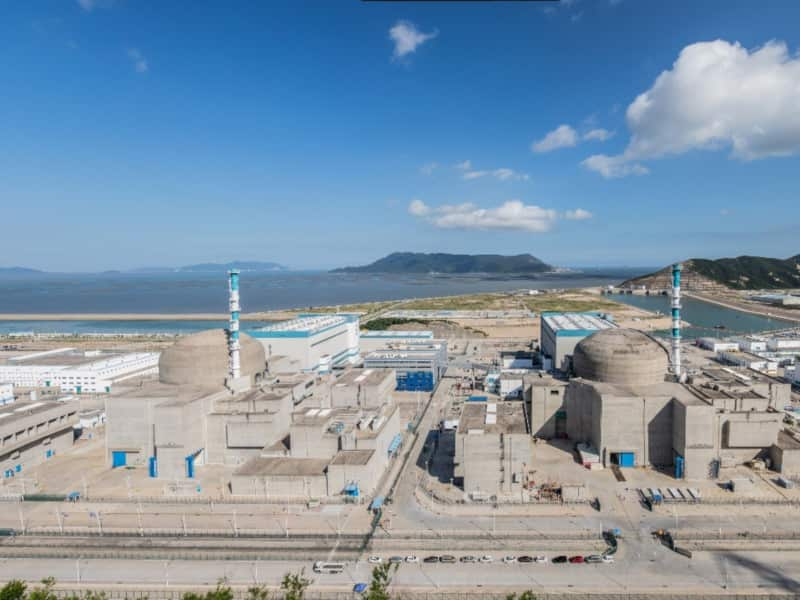A French nuclear firm said it was working to resolve a "performance issue" linked to a gas build-up at a plant it part-owns in southern China, following a US media report of a potential leak there.
CNN reported earlier that the US government is assessing a report of a leak at the Taishan Nuclear Power Plant in populous Guangdong province after the French company, Framatome, warned of an "imminent radiological threat".
EDF, the majority owner of Framatome, said in a statement that it had requested an extraordinary meeting of the power plant's board "for management to present all the data and the necessary decisions".
Framatome said in a statement to AFP that it is "supporting resolution of a performance issue" at the plant.
"According to the data available, the plant is operating within the safety parameters," the company said.
EDF later said that there was an "increase in the concentration of certain noble gases in the primary circuit of reactor no. 1" at Taishan, referring to a part of the reactor's cooling system.
Noble gases are elements like argon, helium and neon which have low chemical reactivity.
Their presence in the system "is a known phenomenon, studied and provided for in the reactor operating procedures," EDF said.
Not at 'crisis level'
Citing a letter from Framatome to the US energy department, CNN said the warning included an accusation that the Chinese safety authority was raising the acceptable limits for radiation outside the facility in order to avoid having to shut it down.
But a US official told the broadcaster that the administration of President Joe Biden believes the facility is not yet at "crisis level".
The operator of the power station, state-owned China General Nuclear Power Group, said in a statement on Sunday evening that "the environmental indicators of Taishan Nuclear Power Plant and its surroundings are normal". It did not reference any leak or incident at the power station, which it said meets "the requirements of nuclear safety regulations and power plant technical specifications."
It did not reference any leak or incident at the power station, which it said meets "the requirements of nuclear safety regulations and power plant technical specifications."

French nuclear firm Framatome says it is investigating reports of a leak at the Taishan Nuclear Power Plant in China. Source: China General Nuclear Power Corporation
The International Atomic Energy Agency, a UN body, said it had contacted its counterpart in China regarding the issue.
"At this stage, the Agency has no indication that a radiological incident occurred," the IAEA said in a statement, adding that it would share more information "as it becomes available".
AFP did not get an immediate response to a request for comment from either the Chinese foreign ministry or the Chinese nuclear power group.
EPR reactors
Powered up in 2018, the Taishan plant was the first worldwide to operate a next-generation EPR nuclear reactor, a pressurised water design that has been subject to years of delays in similar European projects in Britain, France and Finland.
There are now two EPR power units at the plant in the city of Taishan, which sits close to the coastline of southern Guangdong - China's most populous province.
EPR reactors have been touted as promising advances in safety and efficiency over conventional reactors while producing less waste.
French Prime Minister Jean-Marc Ayrault visited the Taishan plant in 2013, on a trip where the French leader shopped his country's nuclear expertise to the massive China market.
Nuclear plants supplied less than five percent of China's annual electricity needs in 2019, according to the National Energy Administration, but this share is expected to grow as Beijing attempts to become carbon neutral by 2060.
China has 47 nuclear plants with a total generation capacity of 48.75 gigawatts - the world's third highest after the United States and France - and has invested billions of dollars to develop its nuclear energy sector.
Last month Russian President Vladimir Putin and his Chinese counterpart Xi Jinping launched work on Russian-built nuclear power plants in China.
And in December state media reported that China had successfully powered up its "artificial sun" nuclear fusion reactor for the first time - the HL-2M Tokamak reactor - which uses a powerful magnetic field to fuse hot plasma and can reach temperatures of over 150 million degrees Celsius.
It is China's largest and most advanced nuclear fusion experimental research device, and scientists hope that it can potentially unlock a powerful clean energy source.
Share



